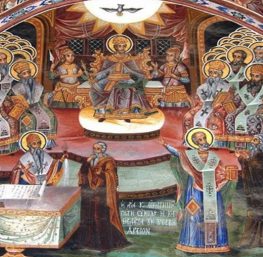
by Fr. Gregory Gresko –
In listening attentively to the Word of God, we come to realize authentic communion with our Lord and are perfected slowly but surely in love of His Will through the transforming power of the Holy Spirit, who is able to safeguard us from despairing or presuming. “If you remain in me and my words remain in you, ask for whatever you want and it will be done for you” (Jn 15.7).
As we continue celebrating the Resurrection of our Lord Jesus Christ during this joyous Easter season, the Gospel passage from Wednesday’s liturgy called us to pause reflectively upon the image of Jesus as the true Vine and His people as the branches. Jesus teaches us: “I am the true vine, and my Father is the vine grower. He takes away every branch in me that does not bear fruit, and everyone that does he prunes so that it bears more fruit . Remain in me, as I remain in you. Just as a branch cannot bear fruit on its own unless it remains on the vine, so neither can you unless you remain in me” (Jn 15.1-5).
In this passage, we notice that it is God the Father Who is the Source growing Christ the Vine. We encounter a dogmatic truth here that the Father and Son are in perfect communion as One, providing us the perfect example of God’s own loving communion to which we long to belong in this life and in the life beyond. Jesus always experiences life to the fullest as He remains perfectly in His Father, giving us hope for the same. God the Father, through Christ the Way, is our Source both of eternal Truth and Life, as Jesus preaches: “I am the Way and the Truth and the Life. Nobody comes to the Father except through Me” (Jn 14.6).
To live life to the fullest in our human existence means following Jesus as the True Way to the Father. As we obey the Word of God in Jesus Christ — step by step and loving action by loving action through the power of the Holy Spirit Whom Jesus promises to send to His faithful to strengthen them — we come to fulfill our destiny of reaching the eternal Life of God the Father, through Jesus Who does so Himself in perfect obedience to His heavenly Father.
The most difficult task indicated in this passage of Jesus as the True Vine may very well rest in a key verb mentioned throughout: Remain. It is not being a branch that is most challenging according to Jesus here; rather to remain proves for us most difficult such that living fruit might be borne from our faithful steadfastness in Him. Jesus clearly desires us to persevere in obedience to the Word of God, Who is Christ Himself (cf. Jn 1.1). Communion is built out of the bricks and mortar of love – that steadfast dedication of lovers who stand daily committed in their love, one for the other. The one who loves, in every big and especially in every little action of love, takes great care to demonstrate faithfulness, steadfast remaining with the person who is to receive his love.
To love, indeed, means in reality to dwell steadfastly within the heart of the other, such that the lover always remains in the heart of his beloved, and the beloved finds her home always in the heart of the one who loves her. This remaining, in a committed way, through the cycle of days, weeks, months, and years is what leads love to bear its greatest fruit, always borne out of lovingly attentive care for the beloved. The experience of suffering often is part and parcel of such a labor of love, calling out to us to remain resolutely patient (from the Latin patiens, meaning “suffering”) with and for the other (cf. 1 Cor 13.4) so that love might be shown in its most powerful strength.
In allowing the Word of Jesus to remain alive in our hearts, we become rooted firmly as branches in Him. Such faith requires out of us a persevering hope that acts in the present day in a manner that bears in mind our being judged in the future for our current actions. True Christians believe fully that they will have to render an account for what has been done right and wrong in this life, before the throne of God in the afterlife (cf. Rev 20.12). As Pope Benedict XVI eloquently explains in his encyclical written on the theological virtue of hope, Spe Salvi (41):
“From the earliest times, the prospect of the Judgment has influenced Christians in their daily living as a criterion by which to order their present life, as a summons to their conscience, and at the same time as hope in God’s justice. Faith in Christ has never looked merely backwards or merely upwards, but always also forwards to the hour of justice that the Lord repeatedly proclaimed. This looking ahead has given Christianity its importance for the present moment”.
Remaining in Jesus as the True Vine means behaving as branches who steadfastly persevere in faith, doing what is right and shunning what is evil at every turn according to a properly formed conscience (cf. Second Vatican Council, Pastoral Constitution Gaudium et Spes 16). One day, at a moment we may least expect, we will stand before God having been remainingly obedient, or un-remainingly disobedient, to Jesus as the Incarnate Word of God.
Few events in Scripture demonstrate the fruits of such an intimate remaining in communion than the solemn Feast of the Ascension, which quickly approaches us in the Church calendar. Here, Jesus ascends in body and soul to His heavenly Father to dwell for eternity. Through His Ascension, Jesus leads us as the True Way, as firstborn from the dead into eternal Life with His Father, if only we choose to remain in Him!
According to the 20th-century German Catholic philosopher Josef Pieper, two fundamental attitudes of the human condition threaten our hope: despair and presumption. When our hope is under attack, our remaining in communion with the True Vine is put at risk. Whenever we succumb to either of these threats to hope, we may hear the Word of Christ but fail truly to listen obediently to Him.
Concerning despair, we may hear Jesus but refuse to hold faithfully to His promise, believing in our hearts that God is not powerful enough to surpass whatever challenge we are confronting, and we thus collapse into an attitude that holds ourselves doomed to fail. In presumption, we claim to know God’s specific will for us in a particular situation, but in fact we have not listened patiently enough for God’s true voice so that we might understand authentically His command for action. If we aren’t careful, both errors can lead us and even those we love to suffer great harm, due to our failure to listen attentively with our hearts to the command of love that God speaks to us as we encounter Him.
We remain in the Vine only through great patience in steadfast prayer, that communication between us and God that may include oratio (speaking to God) but even more importantly will include meditatio (meditating upon the Word of God) and contemplatio (listening to God). It is in these ways that branches grow slowly and surely more firmly attached to the Vine. Such growth may not be noticeable immediately to us at first glance. However over time, just as plants grow slowly but surely, we can rest assured that we will bear great fruit if we simply remain obediently in our faith in Jesus the Word of God.
In listening attentively to the Word of God, we come to realize authentic communion with our Lord and are perfected slowly but surely in love of His Will through the transforming power of the Holy Spirit, who is able to safeguard us from despairing or presuming. When we as branches find ourselves in perfect communion with the vine, it is then that we indeed will be granted our every request in prayer as Jesus promises us: “If you remain in me and my words remain in you, ask for whatever you want and it will be done for you” (Jn 15.7).
HT: Catholic Online



